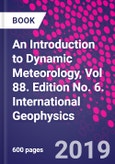An Introduction to Dynamic Meteorology, Sixth Edition, Volume 88 is the latest release in this gold standard for generations of meteorologists who use it as a textbook and reference in their careers. This updated edition reflects the latest research in the field, providing a cogent explanation of the fundamentals of meteorology and an explanation of storm dynamics for weather-oriented meteorologists. The first seven chapters lay the foundation for the study of atmospheric dynamics, with the latter chapters covering more advanced material, ENSO, seasonal dynamics, climate dynamics, and in this new edition, weather-ocean dynamics.
- Presents all-new chapters on weather/ocean dynamics
- Includes new sections on the Helmholtz decomposition and Hadley cell theory
- Provides clear physical explanations of key dynamical principles
- Contains a wealth of illustrations to elucidate text and equations, plus end-of-chapter problems
Table of Contents
1. Introduction 2. Basic Conservation Laws 3. Elementary Applications of the Basic Equations 4. Circulation, Vorticity, and Potential Vorticity 5. Atmospheric Oscillations 6. Quasi-geostrophic Analysis 7. Baroclinic Development 8. The Planetary Boundary Layer 9. Mesoscale Circulations 10. The General Circulation 11. Tropical Dynamics 12. Middle Atmosphere Dynamics 13. Weather-Ocean Dynamics 14. Numerical Modeling and Prediction
Appendix A. Useful Constants and Parameters B. List of Symbols C. Vector Analysis D. Moisture Variables E. Standard Atmosphere Data F. Symmetric Baroclinic Oscillations G. Conditional Probability and Likelihood







